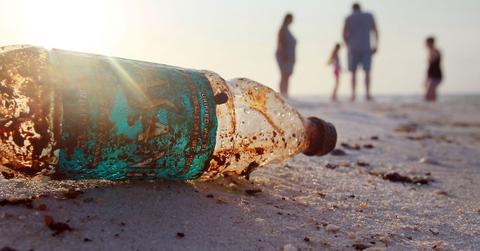Here Are 6 Ways to Celebrate Our Oceans This World Oceans Day
Other than going for a swim, here are six ways to protect oceans in honor of World Oceans Day.
Updated June 8 2020, 10:16 a.m. ET

Last week, on Friday, June 5, people all over the world observed the United Nations' World Environment Day. And today, Monday, June 8, the United Nations is hosting another holiday that supports the planet: World Oceans Day. In honor of the annual holiday, here are six ways you can do something nice for the ocean — as well as a breakdown of why the oceans need a little TLC right now.
According to the World Oceans Day website, the holiday aims to join together people from all over the planet to honor the ocean, "which connects us all." The holiday aims to spread awareness as to how we can protect the ocean. As the website explains, healthy oceans are critical to a healthy planet and to healthy people, because oceans do so much more for us than we realize. Oceans produce oxygen for us to breathe, regulate our climate, clean the water we drink, provide ingredients for medicines, and more.
Every year, between 4.8 and 12.7 million tons of plastic enter the ocean, according to the journal Science. And where does that plastic come from? Humans, of course.
And litter isn't the only plastic trash that winds up in the ocean. Garbage from landfills, trash cans, microfibers, and more is blown into oceans on a daily basis. Fish and other marine animals mistake the plastic for food and they eat it — and sometimes, it even kills them. And then, humans eat fish from the ocean — and those bodies often have microplastics in them, meaning humans are eating plastic. Some experts believe that if we keep going at the current rate, there will be more plastic than fish in the ocean by 2050.
To make sure that doesn't happen, it's important to spread awareness on how we can protect our oceans. Read on for six ways you can pledge to respect oceans in honor of World Oceans Day.
1. Pick Up Trash
One of the most direct ways we can keep plastic out of our oceans is by participating in a trash cleanup. Groups often host organized trash cleanups on World Oceans Day — but with the coronavirus pandemic, your best bet is to get to it on your own (while observing social distancing and proper hand sanitizing, of course). Head out in your neighborhood — or even better, onto a local beach — with a bag and a pair of gloves, and save trash from entering our oceans. You can even get some cardio in at the same time.
2. Use Less Plastic
We've said it before, and we'll say it again: Reduce, reduce, reduce! Green Matters is filled with tips on reducing plastic while grocery shopping, clothes shopping, in the bathroom, and onx what to do with plastic you already have.
If you want to set a measurable goal for yourself in terms of reducing your consumption of single-use plastic, check out the blog Going Zero Waste's 30-day zero-waste challenge.
3. Take Fish Off Your Plate
Commercial fisheries are overfishing (which is catching too many fish and other marine animals at once, making populations too depleted to fully recover, according to EDF), and it's contributing to the climate crisis. According to a study published in the journal Science earlier this year, the global fish population has depleted by 4.1 percent since 1930 — and based on the amount of fish humans eat, that's only going to grow. Unfortunately for seafood lovers, sustainable seafood is a bit of a myth.
So if you eat fish and also care about the planet, it's important to learn how the fish you eat get from the ocean and to your belly — and to look into other dining options that do not hurt animals or the ocean.
4. Support Organizations and Companies Protecting the Oceans
So many amazing organizations are dedicated to cleaning up oceans and protecting the creatures that live in them. Click here for a few suggestions of charities to donate to.
Additionally, consider supporting companies that recover ocean plastic and recycle it into new materials to make their products.
5. Contact Politicians and Companies
If there are oceans surrounding your town or your state, there are probably laws governing them. Write to your local politicians and ask them to prioritize creating and supporting laws that will protect our oceans, as well as laws that ban or limit single-use plastic.
Similarly, write to companies you love that either sell items packaged in single-use plastic, sell single-use plastic items, sell fish as food, or have other business practices that could harm the ocean, and ask them to consider alternatives. These companies exist to supply human demand — so if enough people demand more ethical practices, they will come.
6. Watch a Documentary About the Ocean
Take some time out today to learn about the various ways we are polluting the oceans. There are so many documentaries about the world's oceans — and many of them are on Netflix. Check out Blue Planet, Blue Planet II, A Plastic Ocean, Life in the Blue, and Chasing Coral.